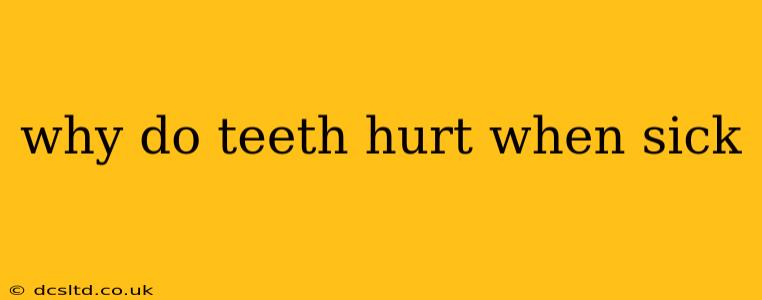Feeling under the weather and suddenly experiencing tooth pain? It's more common than you might think. While a toothache usually points to a dental problem, illness can exacerbate existing dental issues or even trigger tooth sensitivity. Let's explore the various reasons why your teeth might hurt when you're sick.
What Causes Tooth Pain When Sick?
The link between illness and tooth pain isn't always direct. Instead, several factors associated with sickness can contribute to discomfort in your teeth and gums.
Weakened Immune System:
When your body fights off an infection, your immune system is working overtime. This can sometimes lead to a temporary weakening of the immune defenses in your mouth, making you more susceptible to existing or developing oral infections like gum disease (gingivitis or periodontitis) or tooth decay, leading to tooth pain.
Sinus Infections and Toothache:
Sinuses are air-filled cavities located around your nose and cheeks. When infected (sinusitis), the resulting inflammation and pressure can radiate to the upper teeth, mimicking tooth pain. This is especially common in the upper molars and premolars. The pressure and inflammation can cause pain that feels like a toothache, even though the problem is actually in your sinuses.
Dehydration:
Many illnesses cause dehydration, which can reduce saliva production. Saliva is crucial for neutralizing acids in your mouth and washing away food particles that contribute to decay. Less saliva means more acidic buildup, potentially irritating sensitive teeth and gums.
Medication Side Effects:
Some medications taken to combat illness can have side effects that contribute to tooth pain or worsen existing dental problems. For example, certain medications can cause dry mouth, leading to the problems mentioned above. Always check the side effects listed on any medication you are taking.
Bruxism (Teeth Grinding):
Stress, which can accompany illness, often leads to increased teeth grinding (bruxism), even during sleep. This grinding can wear down enamel, expose sensitive dentin, and cause pain and discomfort.
Weakened Jaw Muscles:
Certain illnesses can also cause jaw muscle pain, which can then be misinterpreted as tooth pain, particularly in the temporomandibular joint (TMJ) area. The TMJ connects your jawbone to your skull.
Is It a Toothache or Something Else?
Distinguishing between a true toothache and pain related to an illness can be tricky. Several symptoms can help clarify the source:
- Location of pain: Sinus pain often affects the upper teeth, while a true toothache may be more localized to a specific tooth.
- Type of pain: Sinus pain is often dull and throbbing, whereas a toothache can be sharp, stabbing, or constant.
- Associated symptoms: Other symptoms like nasal congestion, facial pressure, or fever might point toward a sinus infection rather than a dental problem.
When to See a Dentist or Doctor:
If you're experiencing tooth pain alongside illness, it's essential to consult a healthcare professional. A dentist can diagnose any underlying dental problems, while a doctor can assess your overall health and address any systemic issues contributing to your pain. Don't wait for the pain to subside on its own—early intervention is always best.
How to Manage Tooth Pain While Sick:
While waiting for professional help, you can try some home remedies to manage discomfort:
- Rinse with warm salt water: This helps clean the mouth and can soothe inflammation.
- Over-the-counter pain relievers: Ibuprofen or acetaminophen can help alleviate pain and reduce fever.
- Cold compress: Apply a cold compress to your cheek to reduce swelling and numb the area.
- Avoid sugary and acidic foods and drinks: These can irritate sensitive teeth and worsen existing problems.
Remember, this information is for general knowledge and does not substitute professional medical advice. Always consult a dentist or doctor for diagnosis and treatment.
